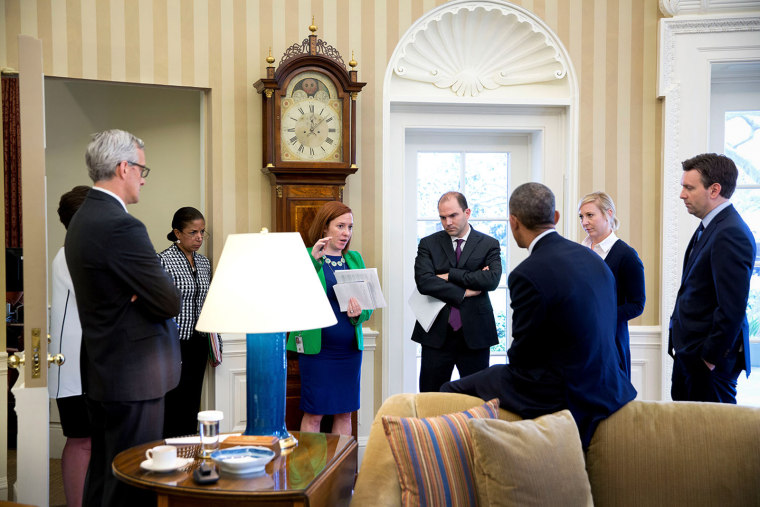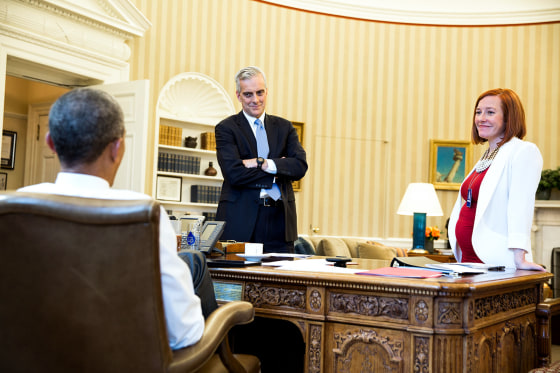The following is an adapted excerpt from Jen Psaki's new book, "Say More: Lessons from Work, the White House, and the World."
The first time I ever really asked for something big at a job, or a potential job, was when I was thirty-six years old. I was sitting in my living room one Saturday afternoon in 2015 when my phone buzzed. It was Denis McDonough, the White House chief of staff. At the time I was the spokesperson at the State Department, and my immediate worry was that Secretary Kerry must have said something that the White House was so mad about, it warranted a call from Denis. I braced myself when I answered.
But that wasn’t why he was calling. He got straight to the point. “President Obama wants you to come back for the final stretch to be the communications director,” he said. “I hope you’ll consider it.”
I loved working at the State Department, but when the president, or one of his representatives, calls and asks you to do something you just immediately say yes . . . right? For the first time, it wasn’t that simple for me.

“I’m honored,” I replied. “But I have to tell you something I haven’t shared with many people yet—I’m pregnant and due in July.”
After only fifteen seconds of consideration, I had talked myself out of the possibility of the communications director job, a role that oversaw the strategy and the messaging for the White House and the president. In that brief time span, I leaped to the conclusion that Denis would immediately decide that someone who was pregnant probably wasn’t the right choice. I figured he would wish me good luck and move to the next name on his list. But that’s not what he did.
“Congratulations,” Denis replied. “I am so excited for you. We’ll figure out how to make everything work for you. Just promise me you’ll think about it.”
“OK,” I said. A bit stunned that the offer still stood in light of my personal news, I quickly realized that this was now a decision I would actually have to make myself. While I was a little daunted, I’m grateful that Denis didn’t just accept my initial response and move on. When you let someone else make a decision for you, you’re eliminating options you might actually want, and giving that person the power over your future.
This can be appealing, because making decisions can be really difficult. But the fear of having to balance priorities, or make sacrifices, or deal with the consequence of your choice can limit your growth. Now it was up to me to decide: Did I want to return to the White House, and to one of the most demanding jobs in government, just months before having my first child?
President Obama called me the next day. I will always remember that he began by apologizing that he didn’t have a lot of time because “the king” (of Jordan) was waiting outside his office. He told me that having children was the best thing that ever happened to him and would be for me as well. He assured me that the team would work with me to figure out everything I needed, if I were to take the job. Which, the suggestion was, I should.
My husband, Greg, and I sat down and talked about what would make the job possible. First, I needed twelve weeks of maternity leave. (At the time, there was no maternity leave policy in the federal government.) Second, we planned to put our daughter in daycare, and I wanted to be able to pick her up every day, which meant leaving work at 5:30 p.m. Greg would also need to arrive at his office a little bit later because he would be responsible for dropping her off in the mornings. I was a little nervous to ask but also confident in my requests when I proposed those terms. For the first time in my career, I felt like I had to prioritize my needs.
Luckily, there’s not a lot of room for cinematic suspense here: Denis and President Obama agreed to my requests and even left the door open for me to ask for anything else I might need once I better understood the demands of being a new mom.
I was also a little worried about being judged by my colleagues and the wider world for choosing to work such a high-intensity job when I had a newborn. But my former colleague Bill Burton gave me a piece of advice that pushed me over the edge.

“You want to be able to tell your daughter that, when she was a baby, you did this job,” he said. And when I was massaging my five-month-old’s stomach while she screamed from constipation during a late-night prep call for a presidential prime-time address, I thought of Bill’s advice.
It will also make a great embarrassing story to tell when she’s a teenager. And we will always have the photos of her playing on the floor with President Obama when I had to pick her up early from daycare and ended up staying for a few hours after the president’s assistant begged me to bring her in to the Oval Office to lighten the mood on a tough day. That same afternoon, Denis took her outside to the playground on the South Lawn and even changed her diaper while I sat in on a meeting.
There were a handful of days that I couldn’t manage to get away and Greg did the daycare pickup, but I did leave at 5:30 p.m. almost every night. I had been so worried to ask Denis for this accommodation, but it was far from the end of the world. People adapt. That’s what cell phones and laptops are actually good for.
My team got used to me leaving the office at 5:30 every day—and arriving around 7:30 a.m., which I was able to do because Greg took care of the morning duties.
That doesn’t mean your team or your bosses will always adapt, but when something is important and you’ve established yourself as a key player, your managers may be more flexible than you expect.
Excerpted from "Say More: Lessons from Work, the White House, and the World," by Jen Psaki. Copyright 2024 © by Jen Psaki. Reprinted by permission of Scribner, an Imprint of Simon & Schuster, LLC

